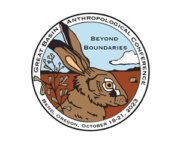FEATURED: Multi-Disciplinary Investigations of Cultural and Ecological Assemblages at the Paisley Caves in the Chewaucan Basin, South-Central Oregon

Today’s featured symposium is “Multi-Disciplinary Investigations of Cultural and Ecological Assemblages at the Paisley Caves in the Chewaucan Basin, South-Central Oregon.” The symposium features nine presentations highlighting ongoing work with the Paisley Caves assemblage. The Paisley Caves are unusually rich repositories of cultural and natural materials accumulated in deposits spanning 16,000 years in age. Located on the high shoreline of pluvial Lake Chewaucan in the Summer Lake sub-basin of the Chewaucan basin, these caves and rockshelters have been professionally investigated twice. First, by Luther Cressman in the period 1937-1940 and later by Dennis Jenkins and the University of Oregon field school between 2002 and 2011. Analyses of fish bone, isotopes, megafauna, small mammals, pollen, macrobotanical remains, birds, and insects assist in reconstructing the local ecology over a period of 16,000 years. A total of 353 radiocarbon dates has been obtained on artifacts, bones, cultural features, coprolites (human and non-human), and naturally accumulated plant and animal remains. Obsidian sourcing and hydration performed on >500 specimens provide new insight into the demography and mobility of local populations spanning >14,000 years. The analysis of human coprolites, perishable and non-perishable artifacts, and cultural features provides clarity into the lifeways and challenges of some of…
